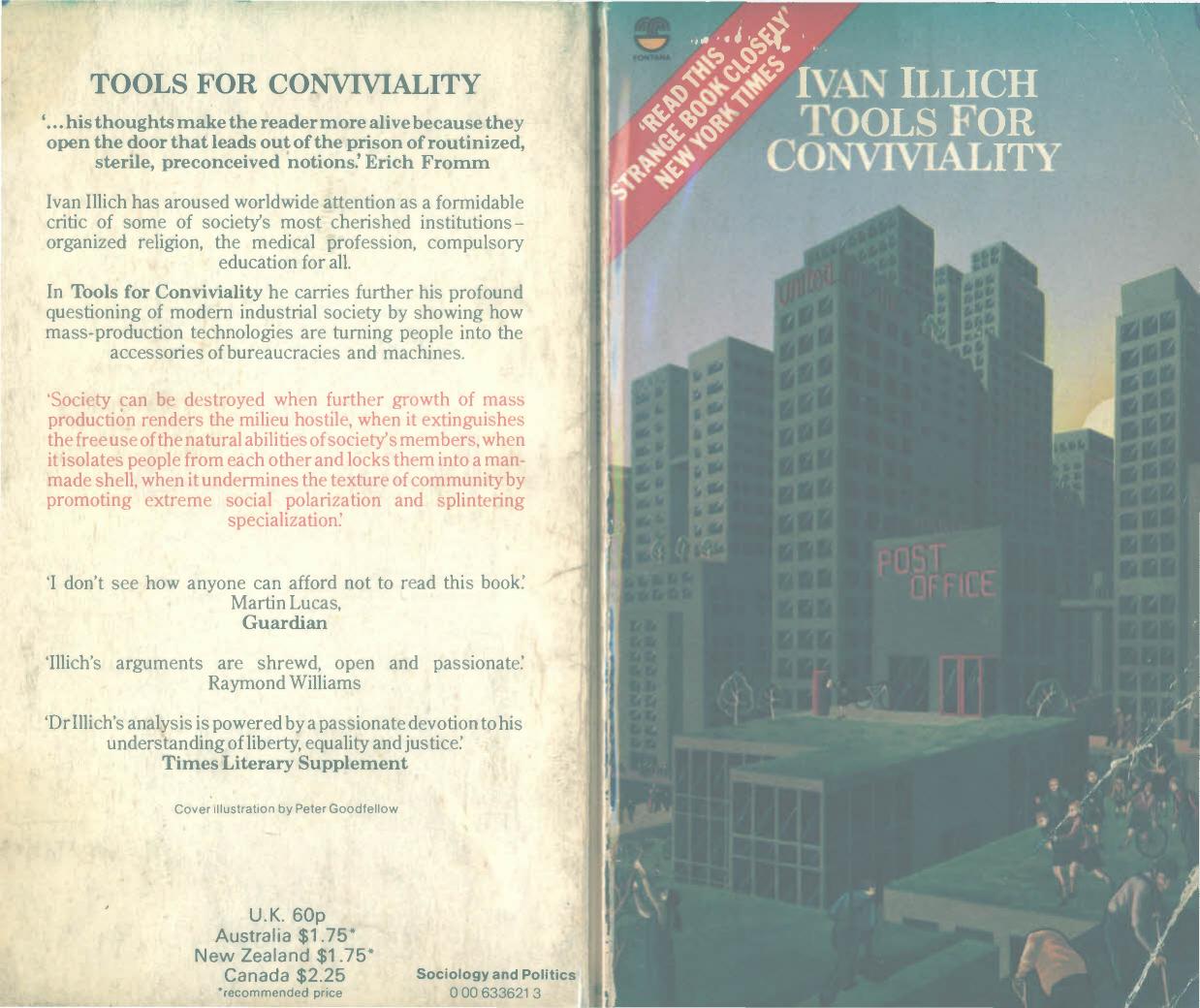Tools for Conviviality by Ivan Illich

Author:Ivan Illich [Illich, Ivan]
Language: eng
Format: epub, pdf
Google: n2lEAAAAYAAJ
Amazon: B007558B04
Publisher: Harper & Row
Published: 1973-01-01T23:00:00+00:00
3. Overprogramming
The balance of learning is determined by the ratio of two kinds of knowledge in a society. The first is a result of the creative action of people on their environment, and the second represents the result of man's "trivialization" by his manufactured milieu. Their first kind of knowledge is derived from the primary involvement of people with each other and from their use of convivial tools; the second accrues to them as a result of purposeful and programmed training to which they are subjected. Speaking the mother tongue is learned in the first way, while some pupils learn mathematics in the second. No sane person would say that speaking or walking or nursing a child is primarily the result of education, while competence in mathematics, ballet dancing, or painting usually is.
The relation between what can be learned from ordinary living and what must be learned as a result of intentional teaching differs widely with place and time. It depends very much on rituals. All Muslims learn some Arabic as the result of prayer. This learning evolves from interaction in a context bounded by tradition. In much the same manner, peasants pick up the folk-lore of their region. Class and caste also generate opportunities to learn. The rich acquire "proper" table manners or accents and insist that these cannot be taught. The poor learn to fend in dignity where no education could teach the rich to survive.
Crucial to how much anyone can learn on his own is the structure of his tools: the less they are convivial, the more they foster teaching. In limited and well-integrated tribes, knowledge is shared quite equally among most members. All people know most of what everybody knows. On a higher level of civilization, new tools are introduced; more people know more things, but not all know how to execute them equally well. Mastery of skill does not yet imply a monopoly of understanding. One can understand fully what a goldsmith does without being one oneself. Men do not have to be cooks to know how to prepare food. This combination of widely shared information and competence for using it is characteristic of a society in which convivial tools prevail. The techniques used are easily understood by observing the artisan at work, but the skills employed are complex and usually can be acquired only through lengthy and programmed apprenticeship. Total learning expands when the range of spontaneous learning widens along with access to an increasing number of taught skills and both liberty and discipline flower. This expansion of the balance of learning cannot go on forever; it is self-limiting. It can be optimized, but it cannot be forcibly extended. One reason is that man's life span is limited. Another-just as inexorable-is that the specialization of tools and the division of labor reinforce each other. When centralization and specialization grow beyond a certain point, they require highly programmed operators and clients. More of what each man must know is due to what another man has designed and has the power to force on him.
Download
This site does not store any files on its server. We only index and link to content provided by other sites. Please contact the content providers to delete copyright contents if any and email us, we'll remove relevant links or contents immediately.
| Administration | Assessment |
| Educational Psychology | Experimental Methods |
| History | Language Experience Approach |
| Philosophy & Social Aspects | Reform & Policy |
| Research |
The Art of Coaching Workbook by Elena Aguilar(48065)
Trainspotting by Irvine Welsh(20055)
Twilight of the Idols With the Antichrist and Ecce Homo by Friedrich Nietzsche(17706)
Fangirl by Rainbow Rowell(7834)
Periodization Training for Sports by Tudor Bompa(7328)
Change Your Questions, Change Your Life by Marilee Adams(6641)
This Is How You Lose Her by Junot Diaz(5772)
Grit by Angela Duckworth(4737)
Red Sparrow by Jason Matthews(4666)
Asking the Right Questions: A Guide to Critical Thinking by M. Neil Browne & Stuart M. Keeley(4574)
Paper Towns by Green John(4169)
Room 212 by Kate Stewart(4107)
Ken Follett - World without end by Ken Follett(3972)
The Sports Rules Book by Human Kinetics(3588)
Housekeeping by Marilynne Robinson(3401)
The Motorcycle Diaries by Ernesto Che Guevara(3332)
Introduction to Kinesiology by Shirl J. Hoffman(3301)
Exercise Technique Manual for Resistance Training by National Strength & Conditioning Association(3292)
Double Down (Diary of a Wimpy Kid Book 11) by Jeff Kinney(3272)
